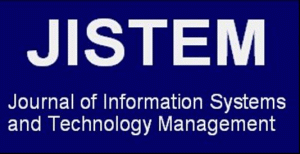The main objective of this study is to identify the antecedents of end-user satisfaction with an Enterprise Resource Planning (ERP) system, in the context of a transnational Bank. The Information System (IS) success theory is applied for the end-user computing satisfaction (EUCS) assessment. Quantitative data is analyzed through multivariate statistical techniques whereas qualitative data is analyzed through content analysis technique. The results indicate that the EUCS model is pertinent to the context of ERP systems for a fast data collection and overall perception of user satisfaction; nevertheless it is suggested the continuity of its evaluation in other research contexts and additional categories should be considered as antecedents to IS enduser satisfaction.
ERP system; information system success; end-user satisfaction; system quality; information quality









